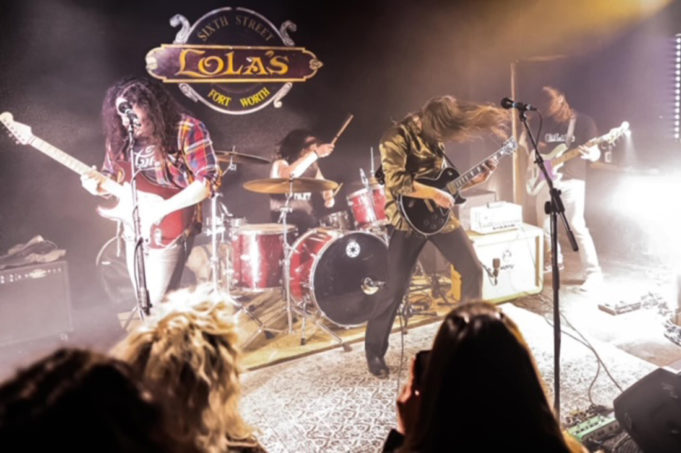What’s really sad to me about Lola’s closing is that I more or less wrote this column once before. In May 2022 (“R.I.P., 3726 W 6th St” ), Lola’s was wrapping up its tenancy at its previous location as the Trailer Park and Saloon, a wonderful spot that in a kind of insult became home to a pastel-colored sports bar called Birdie’s.
“I had a moment a couple weeks ago,” I wrote, “standing on that deck in the northeast corner of Lola’s Trailer Park, when I concluded that Fort Worth is a lot less fun than it used to be.”
Roughly 18 months have passed since then, and now, this city is even less fun, with Lola’s making its closure official via social media yesterday. After 16 years in two different locations as Lola’s — Trailer Park/Saloon on West 6th Street near the Cultural District and Lola’s Fort Worth on West Berry Street near TCU — the business was shuttering.
The news followed Twilite Lounge’s equally dismaying announcement last week of its own closure, and in both instances, the reactions of those venues’ many fans and regulars were a mix of heartfelt sympathy, grateful tributes, and variations of “Why can’t this city keep music venues open?”
To that last part, I hope you know that it is not the responsibility of any city to keep music venues open, and if you posted a comment ascribing blame for the venues’ shuttering to the literal municipal government that is the City of Fort Worth, Texas, I appreciate your anguish, but, please, stop posting stuff like that. Municipalities are not liable for the survival of rock ’n’ roll clubs. The people who live in a city are.
To every person lamenting the loss of Lola’s and Twilite, I have to ask: When was the last time you spent money at those venues? Because people spending money at a club is literally what pays the club’s bills, not the city government and certainly not anyone’s personal nightlife aspirations that culminate in Facebook comments such as “We almost went to that show!” I don’t mean to shame anyone for how they express their grief, but one of the most frustrating — if well-intentioned — comments I’ve read in the wake of all this was something to the effect of “If I’d known last Wednesday was going to be the last show, I would’ve gone!” To which I have to ask: Would you have, really? What kept you elsewhere all the nights when you thought Lola’s was still open?
There are a million reasons for the absence of the people who would have gone to Lola’s if only they’d known it was the bar’s last hurrah, which, in this case, was Big Mike’s Box of Rock a few nights ago. I wasn’t there, for example, and my No. 1 reason is that I work every Wednesday night at a different bar. But even if I didn’t have a long-standing commitment to show up to my job when I am scheduled to, I probably would have stayed home. I am a middle-aged man, and the health of my body and personal finances — both of which I ignored for the better part of a couple decades because spending time and cash at Lola’s and other local venues was imminently more meaningful to me than not doing those things — are two factors that take precedence over a lot of other activities these days. Multiply me by everyone else like me, and our failure to show up at shows takes a toll.
And for a fuller picture, add to this toll a generational shift away from young people engaging with live, local, original music, as well as most of this less-engaged generational cohort having even fewer dollars to spend than people of their age in previous cohorts, plus expecting that cohort to spend money in an economy where everything costs more and where property owners live for the dream of flipping property for even more money are far more important than the hundreds of lives and incomes that music venues positively impact, and that total cost is incredibly difficult for any venue to bear.
Naturally, the economics of a music scene are also just as incredibly difficult for consumers to bear. I’ve read enough gripes about how live music only happens where alcohol is sold, how such places are unappealing to people with tight budgets and/or booze-free lifestyles. It certainly does cost money to go out, but this is true whether you go to a place that sells beer and liquor or some hypothetical, platonically ideal juice bar/coffee bar/kratom bar. Lacking evidence of a successful “third space” in this city for which the bulk of sales come from nonalcoholic offerings, stays open late, and also hosts live music, I can only guess how long such a place might remain open. If such a place existed, I would be shocked if it did so for longer than four months, let alone 16 years.
It is undeniable that there is a dearth in Fort Worth of third spaces where people can hang out until midnight or later that don’t cost any money or revolve around alcohol consumption — I mean, you can’t even go to the Botanic Garden for free anymore during the day, let alone for any event that happens at night there. There are no late-night coffeeshops, few late-night restaurants, and certainly no gathering spaces outside someone’s personal dwelling where you can just sit around with your friends until 2 a.m. without spending any money. Sorry to say, but there are no bands at the Denny’s on Hulen onstage yelling, “What the fuck is up?!”
Also, nothing is free in a live music scene because venues have to pay bills, and it doesn’t matter if they sell beer, coffee, or bottled water sourced from the Ever-Flowing Fountain of Youth. Unless the people opening a venue (or juice bar, or coffee bar, or kratom bar, or oxygen bar, or whatever other bar adequately meets the tastes of the people dissatisfied with bar-bars) also own the building that houses it, they are at the mercy of a landlord. What landlords truly care about the business paying them rent? If they did, wouldn’t rents be lower? Would commercial symbiosis between businesses and landlords be an actual thing then? Probably not. Property owners, no matter how benevolent, are ultimately only real friends with their bottom lines. If one business can’t hack a steep rent increase (“Sorry, bud, market rent is market rent”), there is inevitably another aspirant who will fill that space when the previous occupant goes under. Rinse, wash, repeat until your city is nothing but a bunch of FOR LEASE signs. Why would this be different for a venue that doesn’t expect its patrons to spend money? Perhaps some hypothetical someone could open a nonprofit event space that caters to an alcohol- and commerce-ambivalent clientele, but if you think this is a sustainable solution or, even more imaginatively, an easy, if-you-build-it-they-will-come sort of endeavor, find a person who ran 1919 Hemphill and see what they think about that business model. Or, better yet, put your own ass in the wind and see how your own money fares opening that kind of space. I possess neither the money nor the imagination for a spot like that, but even if I did, unless I owned the property, this fictitious not-for-profit venue is fucked as soon as the property owner is able to sell it to someone who wants to build more apartments.
What will happen to the space where Lola’s came to an end is up to whoever owns it — anything can be leveled and rebuilt into five stories of multi-family dwellings that few families can actually afford, but some real estate player will inevitably pitch it to someone with big-enough dreams, standing up another proverbial entrepreneurial domino to fall down. Sadly, Lola’s follows the demises of the Americado Food Hall (2019), the Moon Bar (2020), and the Berry Street Ice House (2021) at 2000 W. Berry St. What I, as an ignoramus who does not know anything about commercial real estate, cannot help but wonder is: What is the common denominator among four businesses that couldn’t make it work at that spot? In my ignorance, all I can think of is who has owned the property all this time. Has it not been the same owner? What does that person have to do with these businesses’ failures? I doubt I will know the real story. I guess it doesn’t really matter if the end is still “Dang, sucks that they had to close.”
I loved Lola’s. Oh, sure. I loved it a lot more when it was on 6th Street, but that was a different time for me, and I was glad that their move to Berry furthered the continuity of a music scene I’ve been a part of for over 20 years. I was even more glad to see it hang in there on Berry Street for as long as it did. I went when I could, I played there one time, and I’m grateful to have had those experiences. But Lola’s was more than its locations. I am reluctant to spout my own torrents of “I was there for X and Y show and played there in S, T, U, V, W, X, Y, and Z bands,” because pretty much anyone in Fort Worth who enjoys live music and/or plays or used to play in a live band already told that story on Facebook in the hours after the bar’s farewell dispatch. But, yeah, I was there, too, playing on its stages and watching my friends do the same and, even for four months in 2011, serving drinks from behind its bars. And in all of those capacities, I felt like I was part of a not-so-secret Fort Worth rock ’n’ roll society, a wheels-off extended family that was a distinctive pillar of Fort Worth culture. Lola’s was the locus of a prominent sector or Fort Worth’s music scene, a bridge between the wild-ass days of the early 2000s and whatever happens next, and its fate marks the true end of that era. I miss it already.
Nothing lasts forever, but it’s still tough to say goodbye at the end. Thanks, Brian, Josie, et al for giving us a home all this time. We wouldn’t have had a scene without y’all and your bar, because Lola’s really did make living in Fort Worth a pretty good time.











